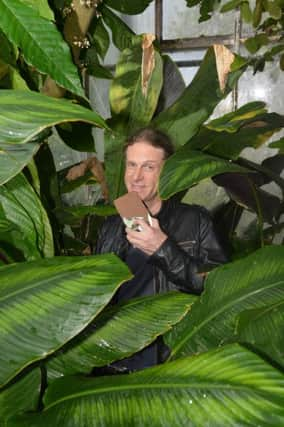Botanist on the front lines of battle to save chocolate


It may sound unlikely but the threat of a global shortage is very real, with demand increasing by 2.5 per cent every year.
Fortunately, Dr James Richardson, a tropical botanist for the Royal Botanic Garden Edinburgh, is here to head off the crisis.
Advertisement
Hide AdAdvertisement
Hide AdChocoholics will be able to ask him questions about his research and how it can contribute towards a solution when he appears at the attraction tomorrow for BBC Radio 4’s Gardeners’ Question Time Summer Party.
Among threats faced by the cocoa tree or “Theobroma cacao” – the plant from which chocolate is produced – are climate change, fungal diseases, global demand outstripping supply and cocaine production destroying habitat.
Dr Richardson, who is working with counterparts in Colombia and the United States to combat the problem, said: “The biggest potential threat is fungal diseases. About ten or 15 years ago witches’ broom had a massive impact on the chocolate industry and resulted in lots of people losing their jobs.
“I’m not an economist but a major issue is the growth in the Asian markets in Indian and China, where populations are growing and industry is not able to keep up with demand.”
Advertisement
Hide AdAdvertisement
Hide AdDespite concerns, the discovery that the cocoa tree has been around for ten million years – and evolved as the Andes were being formed – has given conservationists hope for the future of chocolate production.
Dr Richardson’s pioneering research suggests the source of the treat is much older than realised and may have close relations capable of satisfying sweet-toothed consumers.
He said: “This means there may be forms of chocolate in the native ranges that might be more resistant to disease.
“It also means that there might be novel flowers that haven’t been discovered yet which could be brought into cultivation to improve production and the range of flavours.”
Advertisement
Hide AdAdvertisement
Hide AdHe wants to see production increased in a sustainable manner which would see more crops grown on previously cultivated land.
Cocoa is native to Mexico, Central America and northern South America.
The edible properties of cocoa were discovered more than 2000 years ago by the people of Central America who lived deep in the tropical rainforests. Chocolate was also found in Mexico by Christopher Columbus in 1502.
The name Theobroma cacao was given by the botanist Carl Linnaeus in 1753. Theobroma means “food of the gods” in Latin, and cacao is derived from Aztec for bitter water.
• The Radio 4 event will be held from 10am to 5pm tomorrow (July 9) in the RBGE Plants and People Glasshouse. Tickets cost £10.50 for adults and £5 for children.